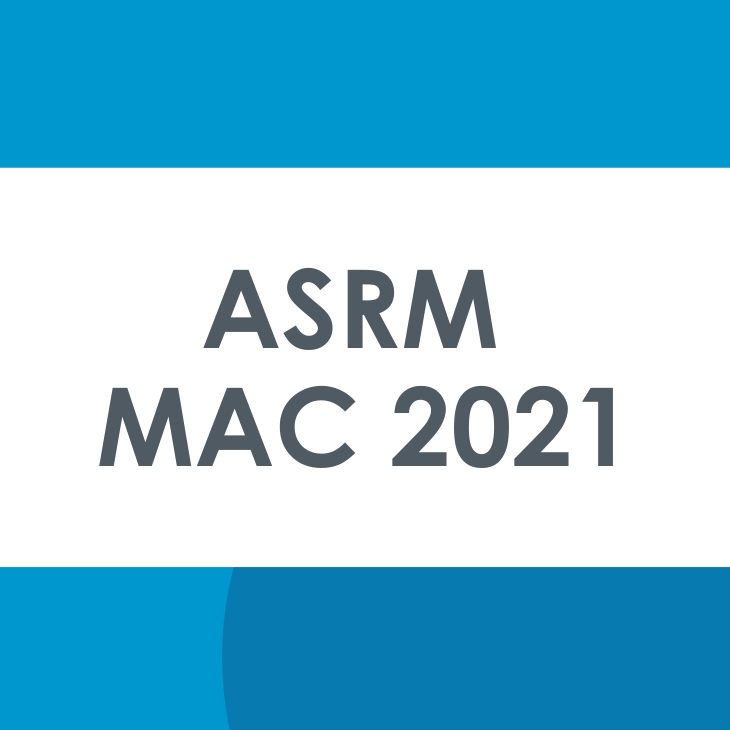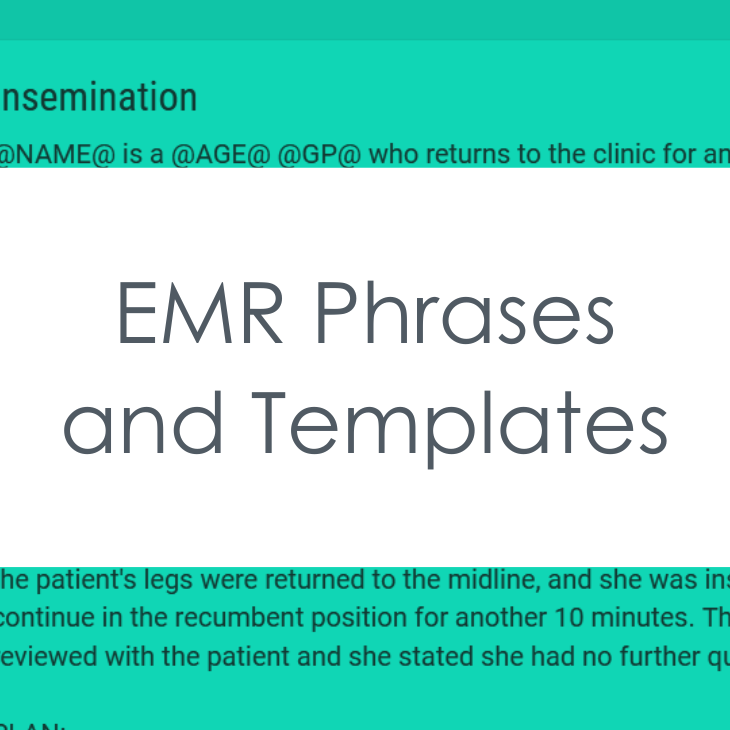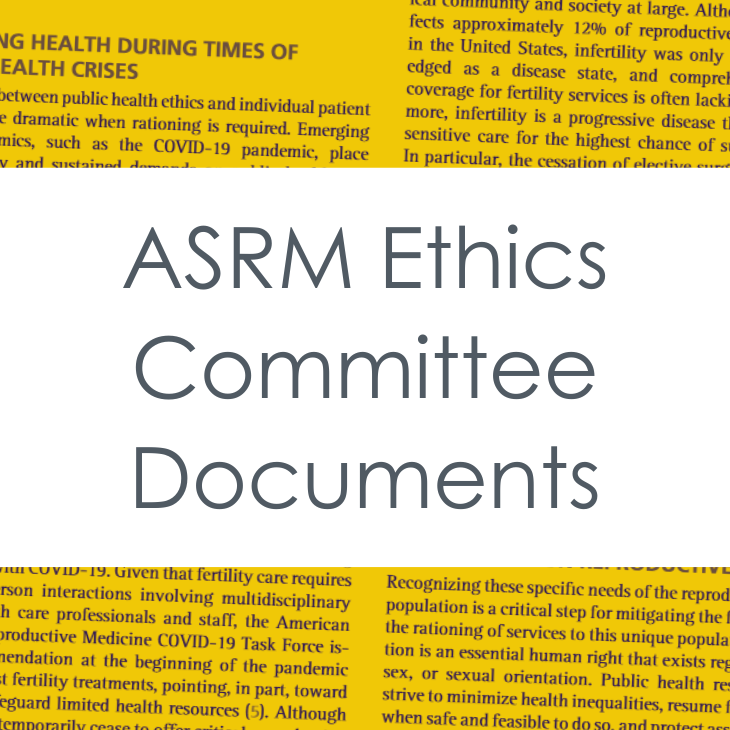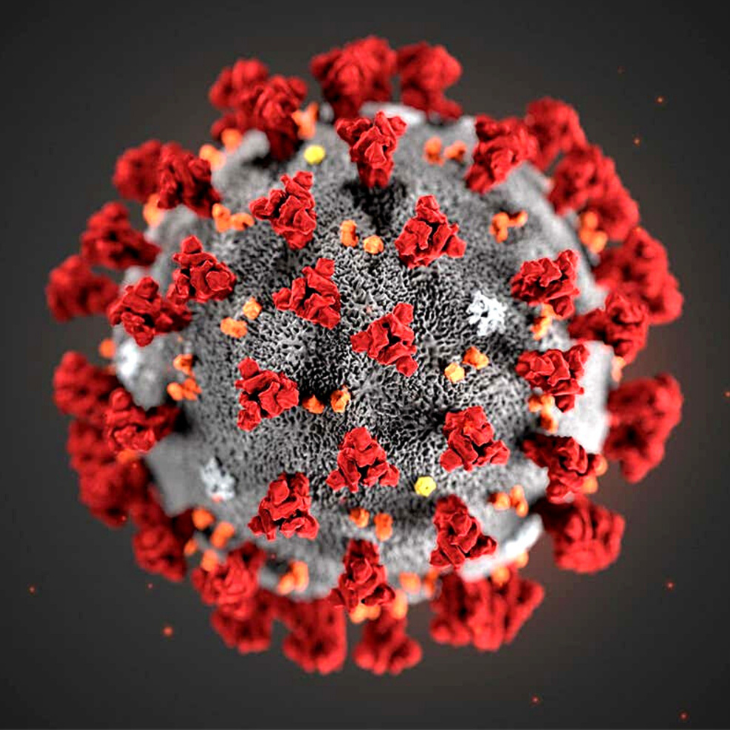Current recommendations for vaccines for female infertility patients: a committee opinion (2018)
Encounters for infertility care are opportunities to assess and update immunization status. Women of reproductive age often are unaware of their need for immunization, their own immunization status, and the potentially serious consequences of preventable disease on pregnancy outcome. In one study, fewer than 60% of surveyed obstetrician-gynecologists routinely obtained any vaccination history, and only 10% offered vaccines currently recommended for adults (1). National standards for vaccinations have been established and last updated in February 2016 by the Centers for Disease Control and Prevention (CDC) and are available for review on the CDC website (2). The purpose of the present document is to summarize current recommendations regarding vaccinations for female infertility patients.
Ideally, immunizations should be completed before conception because some recommended vaccinations cannot be administered during pregnancy (1–5). Vaccinations before or during pregnancy protect women from potentially serious illnesses, prevent vertical transmission to the fetus, and confer passive immunity to the newborn. Transport of maternal immunoglobulin (IgG) antibodies to the fetus occurs throughout gestation and increases markedly during the last 4 to 6 weeks of gestation (3–5). Many physicians are reluctant to immunize pregnant women because of concerns that an incidental congenital anomaly or spontaneous abortion might be attributed wrongly to a vaccination. This fear persists despite the fact that there are few vaccines that are contraindicated during pregnancy (2). The contraindicated vaccines include measles, mumps, and rubella (MMR); varicella; and herpes zoster. All others are either fully recommended or recommended if some other risk factor is present. Vaccinations during pregnancy are indicated when benefits clearly outweigh risks. Special circumstances that may influence the indication for vaccination include military service, travel to high prevalence areas, hazardous occupations, immunocompromised patients, and chronic illness. Guidelines for vaccinations in individuals with such special indications are outlined in a committee opinion published by the CDC (2).
Immunizations generally recommended for women of reproductive age are listed in Table 1, which provides a condensed summary of the Recommended Adult Immunization Schedule published by the CDC. Physicians are encouraged strongly to assess the history of immunizations in women before beginning treatment for infertility.
VACCINATION BEFORE INFERTILITY TREATMENT AND DURING PREGNANCY
Ideally, immunizations should be completed before conception because some recommended vaccinations cannot be administered during pregnancy (1–5). Vaccinations before or during pregnancy protect women from potentially serious illnesses, prevent vertical transmission to the fetus, and confer passive immunity to the newborn. Transport of maternal immunoglobulin (IgG) antibodies to the fetus occurs throughout gestation and increases markedly during the last 4 to 6 weeks of gestation (3–5). Many physicians are reluctant to immunize pregnant women because of concerns that an incidental congenital anomaly or spontaneous abortion might be attributed wrongly to a vaccination. This fear persists despite the fact that there are few vaccines that are contraindicated during pregnancy (2). The contraindicated vaccines include measles, mumps, and rubella (MMR); varicella; and herpes zoster. All others are either fully recommended or recommended if some other risk factor is present. Vaccinations during pregnancy are indicated when benefits clearly outweigh risks. Special circumstances that may influence the indication for vaccination include military service, travel to high prevalence areas, hazardous occupations, immunocompromised patients, and chronic illness. Guidelines for vaccinations in individuals with such special indications are outlined in a committee opinion published by the CDC (2).Immunizations generally recommended for women of reproductive age are listed in Table 1, which provides a condensed summary of the Recommended Adult Immunization Schedule published by the CDC. Physicians are encouraged strongly to assess the history of immunizations in women before beginning treatment for infertility.
Table 1. Summary of the recommended adult immunization schedule outline by the Centers for Disease Control and Prevention (2).
| Age group (y) | ||||||
| Vaccine | 19–21 | 22–26 | 27–49 | 50–59 | 60–64 | ≥65 |
| Influenz (a) | 1 dose annually (b) | |||||
| Tetanus, diphtheria, pertussis (Td/ Tdap) (a) |
Substitute 1-time dose of Tdap for Td booster; then boost with Td every 10 years (b) | Td/Tdap (d) | ||||
| Varicella(e) | 2 doses (b) | |||||
| Human papilloma virus (HPV) (a) Female |
3 doses (b) | No recommendation | ||||
| Human papilloma virus (HPV) (a) Male | 3 doses (19–21 y (b); 22–26 y (c)) | No recommendation | ||||
| Measles, mumps, rubella (MMR) (a,e) | 1 or 2 doses (b) | No recommendation | ||||
| Pneumococcal (polysaccharide) | 1 or 2 doses (c) | 1 dose (b) | ||||
| Meningococcal(a) | 1 or more doses (c) | |||||
| Hepatitis A (a) | 2–3 doses depending on vaccine (c) | |||||
| Hepatitis B (a) | 3 doses (c) | |||||
| (a) Covered by the Vaccine Injury Compensation Program. (b) For all persons in this category who meet the age requirements and who lack documentation of vaccination or have no evidence of previous infection. (c) Recommended if some other risk factor is present (e.g., based on medical, occupational, lifestyle, or other indications). (d) Tdap recommended for ≥65 if contact with <12-month-old child. Either Td or Tdap can be used if no infant contact (e) For nonpregnant women. |
||||||
ROUTINE VACCINATIONS
Influenza
Annual influenza vaccination is recommended for all individuals 6 months of age and older. Women who are pregnant or contemplating pregnancy should be immunized because influenza infection may increase the risk for medical complications, as heart rate, stroke volume, and oxygen consumption are increased and lung capacity is decreased during pregnancy. The optimal interval for immunization spans the months of October and November because the flu season occurs during January through March. Injectable influenza vaccines, inactivated influenza vaccine (IIV) quadrivalent and trivalent, contain inactivated virus and therefore may be administered at any time during pregnancy. In contrast, intranasal influenza vaccines contain live attenuated virus and should not be administered during pregnancy.Concerns had previously been raised about administering thimerosol-containing influenza vaccine to pregnant women. Thimerosol is a mercury-based preservative used in vaccines that was thought to be associated with adverse effects. However, no scientific evidence has correlated ill effects in the children born to women who have taken vaccines containing thimerosol (6). Therefore, IIVs can be given to pregnant women whether they contain thimerosol or not.
Tetanus-Diphtheria-Pertussis (Tdap) and Tetanus-Diphtheria (Td)
A tetanus toxoid, reduced diphtheria toxoid, and acellular pertussis vaccine (Tdap) was approved by the Advisory Committee on Immunization Practices (ACIP) in 2011 and was recommended for adults (19 to 64 years of age) who have or who anticipate having close contact with an infant less than 12 months of age (7). Due to the recent increase in pertussis outbreaks, health-care providers should vaccinate women who are pregnant or might become pregnant and have not previously received Tdap. If they are currently pregnant, Tdap preferably should be administered during the third trimester or late second trimester (i.e., after 20 weeks' gestation). If not given during pregnancy, it should be administered immediately postpartum to ensure pertussis immunity and to reduce transmission to the newborn.
Varicella
Varicella vaccine contains live attenuated virus. Prior to pregnancy, all adults without evidence of immunity should receive 2 doses of single-antigen varicella vaccine administered 1month apart or a second dose if they have previously received only 1 dose. Pregnancy should be avoided for 1 month after vaccination. If exposed to varicella prior to pregnancy, the vaccine should be administered within 96 hours of exposure and pregnancy avoided. Pregnant women should be assessed for evidence of varicella immunity. Pregnant women who do not show signs of immunity should receive the first dose of varicella vaccine upon completion or termination of pregnancy and before discharge from the hospital. Cases of congenital varicella after immunization have been reported.
Human Papillomavirus (HPV)
Women through age 26 and men through age 21 should be vaccinated to prevent HPV infections and HPV-associated diseases, including cancers; the dosing schedule varies based on the age that vaccination started (2). Originally, the HPV vaccine was a bivalent compound; however, the current vaccine is either quadrivalent or 9-valent (9v). Individuals who began with bivalent or quadrivalent compounds may complete the series with the 9v HPV compound. There is no ACIP recommendation regarding additional vaccination with 9v HPV for those individuals who completed immunization with bivalent or quadrivalent vaccines. While HPV vaccination is not recommended during pregnancy, there is no evidence that the vaccine is harmful, and no intervention is needed for women who inadvertently receive it while pregnant. Women who discover they are pregnant should delay remaining doses until after pregnancy. Pregnancy testing is not needed before vaccination (8).
Measles, Mumps, and Rubella (MMR)
MMR vaccine is recommended for all women without confirmed immunity to rubella. MMR vaccine contains live attenuated virus. Vaccination therefore should be administered before pregnancy to avoid the possibility of intrauterine infection, and pregnancy should be avoided for 1 month after vaccination. However, there is no confirmed instance where MMR vaccine has been linked to congenital malformation or significant intrauterine infection (9). Consequently, inadvertent MMR administration during pregnancy is not an indication for pregnancy termination.
NON-ROUTINE VACCINATIONS
Pneumococcus
The pneumococcal vaccine is recommended for any person at increased risk for pneumococcal infection. Individuals at high risk include those with asplenia, sickle-cell anemia, chronic cardiovascular/pulmonary disease, diabetes, or immunocompromise as may result from human immunodeficiency virus (HIV) infection, systemic illness, or malignancy. Ideally, high-risk women should be immunized before pregnancy.
Hepatitis A (HA)
HA vaccine is recommended for any women at high risk, including those receiving clotting-factor concentrates, those with chronic liver disease, women working with HA virus or HA-infected laboratory animals, women traveling to countries with a high prevalence of HA infection, and intravenous drug users. The vaccine contains inactivated virus and poses no known risk to the fetus.
Hepatitis B (HB)
HB vaccine is approved for any woman at high risk, including those receiving hemodialysis or clotting-factor concentrates, health-care workers exposed to blood and blood products, intravenous drug users, women having a sexually transmitted infection or multiple sexual partners, those traveling to countries with a high prevalence of hepatitis B infection, and women living in the same household with a known infected individual. The vaccine contains noninfectious DNA particles, can be administered during pregnancy if needed, and poses no known risk to the fetus.
Meningococcus
The meningococcal vaccine should be administered to any person who is at increased risk for meningococcal infection. For pregnant women, its use should be limited to those at high risk who have not been inoculated previously. Individuals at high risk include those who live in high endemic areas, such as sub-Saharan Africa, parts of the Middle East, and college dormitories. Preferably, such high-risk women should be vaccinated before pregnancy, because experience with the vaccine in pregnancy is limited.SUMMARY
- Vaccination in women of reproductive age before or during pregnancy confers resistance to intrauterine infections and provides the newborn with passive immunity to neonatal infections.
- Immunization schedules are best completed before beginning treatment for infertility, because some vaccinations should not be administered during pregnancy.
- Rubella and varicella immunity should be documented prior to pregnancy. If nonimmune, the vaccine should be administered and pregnancy should be avoided for 4 weeks.
- The influenza and Td immunizations should be completed before pregnancy but can be administered during pregnancy. The inactivated influenza vaccine can be given anytime during pregnancy. Tdap should be given preferably during the third trimester or late second trimester.
- Varicella, pneumococcal, HPV, HA, HB, and meningococcal vaccinations are indicated in specific circumstances and are always administered best before pregnancy.
CONCLUSIONS
- Prior to, during, or after pregnancy, it is important to be aware of a patient's immunization history and to update her vaccine status when appropriate.
Acknowledgments:
This report was developed under the direction of the Practice Committee of the American Society for Reproductive Medicine as a service to its members and other practicing clinicians. Although this document reflects appropriate management of a problem encountered in the practice of reproductive medicine, it is not intended to be the only approved standard of practice or to dictate an exclusive course of treatment. Other plans of management may be appropriate, taking into account the needs of the individual patient, available resources, and institutional or clinical practice limitations. The Practice Committee and the Board of Directors of the American Society for Reproductive Medicine have approved this report.The following members of the ASRM Practice Committee participated in the development of this document. All Committee members disclosed commercial and financial relationships with manufacturers or distributors of goods or services used to treat patients. Members of the Committee who were found to have conflicts of interest based on the relationships disclosed did not participate in the discussion or development of this document.
Alan Penzias, MD; Kristin Bendikson, MD; Samantha Butts, MD, MSCE; Tommaso Falcone, MD; Susan Gitlin, PhD; Clarisa Gracia, MD, MSCE; Karl Hansen, MD, PhD; Sangita Jindal, PhD; Jennifer Mersereau, MD; Randall Odem, MD; Robert Rebar, MD; Richard Reindollar, MD; Mitchell Rosen, MD; Jay Sandlow, MD; Peter Schlegel, MD; Dale Stovall, MD.
REFERENCES
- Schrag SJ, Fiore AE, Gonik B, Malik T, Reef S, Singleton JA, et al. Vaccination and perinatal infection prevention practices among obstetrician-gynecologists. Obstet Gynecol 2003;101:704–10.
- Centers for Disease Control and Prevention. Recommended adult immunization schedule—United States 2016. Available at: http://www.cdc.gov/vaccines/schedules/downloads/adult/adult-combined-schedule.pdf.
- R Monif G, Baker DA. Infectious diseases in obstetrics and gynecology, United Kingdom. 5th ed. London: Taylor and Francis; 2004.
- Munoz FM, Englund JA. Vaccines in pregnancy. Infect Dis Clin North Am 2001;15:253–71.
- Gonik B, Fasano N, Foster S. The obstetrician-gynecologist's role in adult immunization. Am J Obstet Gynecol 2002;187:984–8.
- Fiore AE, Shay DK, Broder K, Iskander JK, Uyeki TM, et al. Prevention and control of seasonal influenza with vaccines: recommendations of the Advisory Committee on Immunization Practices (ACIP), 2009. Centers for Disease Control and Prevention. MMWR Recomm Rep 2009;201:58(RR-8):1–52.
- Centers for Disease Control and Prevention (CDC). Updated recommendations for use of tetanus toxoid, reduced diphtheria toxoid and acellular pertussis (Tdap) vaccine from the Advisory Committee on Immunization Practices, 2010. MMWR Morb Mortal Wkly Rep 2011;60:13–5.
- Use of a 2-dose schedule for human papillomavirus vaccination — Updated recommendations of the Advisory Committee on Immunization Practices. MMWR Wkly 2016;65:1405–8.
- Soares RC, Siqueira MM, Toscano CM, Maia Mde L, Flannery B, Sato HK, et al. Follow-up study of unknowingly pregnant women vaccinated against rubella in Brazil, 2001-2002. J Infect Dis 2011;204:S729–36.
Practice Documents
ASRM Practice Documents have been developed to assist physicians with clinical decisions regarding the care of their patients.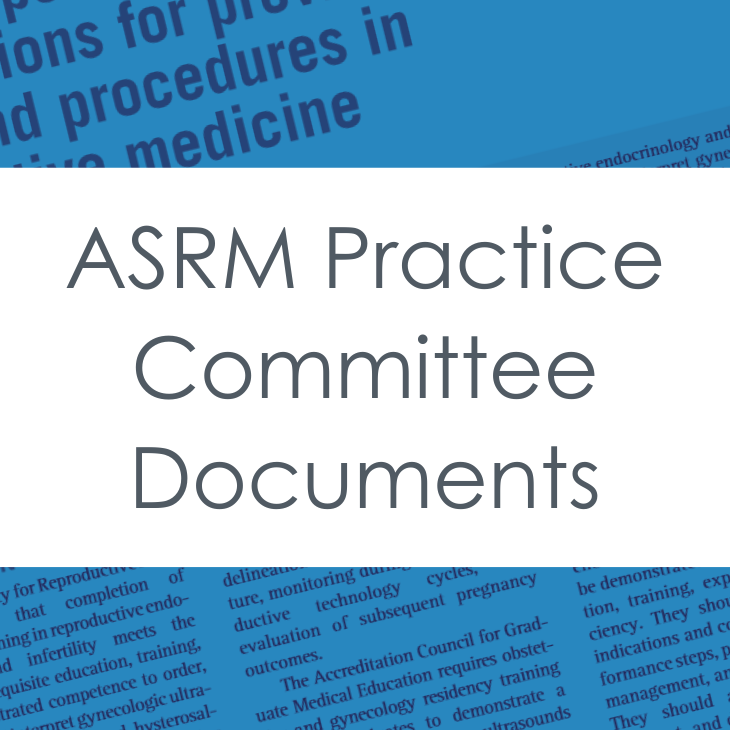
Tobacco or marijuana use and infertility: a committee opinion (2023)
In the United States, approximately 21% of adults report some form of tobacco use, although 18% report marijuana use.
Prevention of moderate and severe ovarian hyperstimulation syndrome: a guideline (2023)
Ovarian hyperstimulation syndrome is a serious complication associatedwith assisted reproductive technology.
Definition of infertility: a committee opinion (2023)
‘‘Infertility’’ is a disease, condition, or status characterized by several factors.
Clinical management of mosaic results from preimplantation genetic testing for aneuploidy of blastocysts: a committee opinion (2023)
This document incorporates studies about mosaic embryo transfer and provides evidence-based considerations for embryos with mosaic results on PGT-A.Topic Resources
View more on the topic of vaccination

